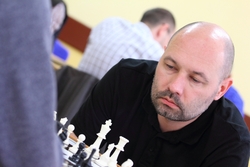
Omne trinum perfectum or The third tournament in Collegium Minus
When something is being done for the third time in a row, the initial excitement begins to give way to routine and quiet confidence that everything will be more or less all right. And so it was with the third edition of our tournament in Collegium Minus. The only major changes we made was to register the tournament to be rated by FIDE, which in turn required changing the time controls to 60 minutes per player per game with an increment of 30 seconds from move one (a minimum stipulated by FIDE for classic time controls and players rated below 2199), as well as to extend the duration of the tournament to three days in order to accommodate the longer games. Owing perhaps to the former factor, the initial interest in the event exceeded our expectations: having registered first 50 players (the limit we initially set), I had to create the reserve list, since more and more people declared their interest in participating; this list grew eventually to encompass almost 20 people. Imagine my surprise then when in the Friday afternoon of May 6th only 38 people turned up. Fortunately, it has quickly turned out that this was to be the only disappointment the tournament brought us: fighting chess prevailed, a lot of upsets happened over the boards, many people earned norms of Polish Chess Federation and entered FIDE rating list (some with surprisingly high ratings). What’s more to expect from a chess tournament? Yours truly was again a deputy arbiter, this time assisting my club mate Jerzy Łapiński from Włocławek. I had only one claim to investigate: one of the players, in slight time trouble, claimed the threefold repetition—a claim not worth mentioning, were it not for the fact that the other player was confident that no such repetition took place. Having then consulted the chief arbiter, I analyzed the score sheets and declared draw, since the claim turned out to be correct.
As usual, during organizing the event, we met many friendly and generous people, among whom professor Radosław Sojak, Dean Elect of the NCU’s Faculty of Humanities, Kinga Nemere-Czachowska of the NCU alumni program and our chief arbiter Jerzy Łapiński deserve special thanks. I would also like to express my gratitude towards Janusz Augustowski, Anna Bielawiec-Osińska, Jan Kamiński, Zuzanna Kopidurska, my daughter Agnieszka Pituła and Damian Turula.
And the title? When after the tournament we were heading home, I said to my friend Krzysztof that I would like to title my blog post “Omne trinum perfectum”—all good things go by threes, only to find him laughing that only two days ago I was disappointed by a poor attendance and now I think that we had the best tournament ever. This time he misunderstood me, though: I didn’t think we organized the perfect tournament (although it is always good to strive for one  ). The perfect thing was that there was again the three of us—my friend, my daughter and myself—working together on an event we all liked.
). The perfect thing was that there was again the three of us—my friend, my daughter and myself—working together on an event we all liked.

Chief arbiter Jerzy Łapiński (pictured during the Marian Będziński Memorial in Włocławek)

Michał Basiński played strongly, entering the FIDE list with ELO around 1600

Wherever there is Janusz,...

...one can also expect his Eeyore

More of my friends from Włocławek: Maciej Kaczyński...

...and Robert Miłecki

Jan Cichecki: lots of experience won during Schachbundesliga tournaments

Michał Sokulski showed some uncompromising chess

Jerzy Jabłoński, the oldest and most titled participant of the tournament

Trophies waiting for the winners

This time even board number 13 was no obstacle for Mateusz Wieczorek. He played confidently and strongly, gaining some ELO points. Below is his first round victory over Swietłana Czerwonnaja, a very experienced player herself: a truly seesaw game, quite blunderful but amusing enough to be shared, especially that in the endgame Mateusz was in severe time trouble, playing virtually on increment, yet he was able to calculate many of his moves calmly and precisely, utilizing almost all the time he had in his disposal, sometimes letting the clock go down even as low as to 2 seconds:

Dmitry Grigorovich, an unrated player, author of some most surprising upsets of the tournament, entered the FIDE list with ELO 1725. Unfortunately, Dmitry lost his momentum in three last rounds, but the higher norms for him are only a question of time

Adam Filipiak: sealing the win over Konrad Marzec in round six

A neat row of captured pieces

My friend Krzysztof (R), together with professor Radosław Sojak, Dean Elect of the Humanities, closing the tournament

Third place: Radosław Błajet

Mariusz Darowicki from Świecie finished second

And the winner is... Daniel Ludwiński! Undefeated, with 6 out of 7, TPR of 2088 (another norm for the Polish first category) and 50 points ELO gain. Trademark: contagious smile. Daniel will surely keep the tournaments in Collegium Minus in good memory: tenth in the first edition and fourth in second, he undisputedly climbed the top in the third one
The third tournament in Collegium Minus took place between 6th and 8th May 2016. 38 people from 6 towns participated, among them three women and ten juniors. Top seed was Mirosław Jabłoński (FIDE 2017). Full results can be found here. More pictures by yours truly and Anna Bielawiec-Osińska here.




